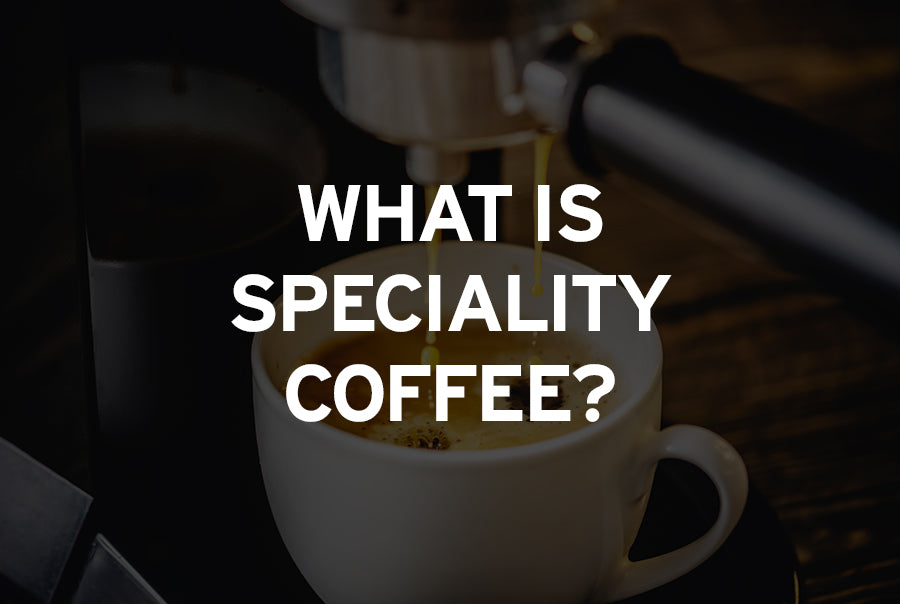Specialty Coffee refers to coffee that is graded 80 points or higher, on a 100 point scale, which has been certified by a licensed Specialty Coffee Association (SCA) Q Grader (CQI).
Specialty coffees are considered to be exceptional in comparison to other coffee due to A multitude of factors, including, the coffee been grown at the perfect altitude, at the correct time of year, in the best soil, and then picked at just the right time. There is a rigorous process at each stage of the coffee life cycle in order that a coffee can meet the high bench-mark of being certified ‘Specialty Grade’.
See our specialty coffee grading sheet below
SPECIALTY COFFEE - Q GRADE SCORE SHEET
|
SCORE |
GRADE |
SPECIALTY YES/NO |
|---|---|---|
|
90-100 |
Outstanding |
Specialty Coffee |
|
85-89.99 |
Excellent |
Specialty Coffee |
|
80-84.99 |
Very Good |
Specialty Coffee |
|
>80.0 |
Below Specialty Quality |
Not Specialty Coffee |
SUMMARY
Speciality coffee is defined as any coffee that scores above 80 points on a 100 point scale.
Typically, speciality coffee is grown at high altitudes, with much care and attention from the farmer. From there, it is sold at a premium to coffee traders, or direct to roasters.
The roasters then create custom profiles for each coffee, enhancing and highlighting their natural flavours.
HISTORY
Speciality coffee has existed for a long time, in one form or another. We tend to think of speciality coffee as being a new trend, yet even as far back as the early 1900s, discerning customers like the Hotel du Crillon in Paris specified that their coffee was to be bought from select micro-lots on specific farms in certain regions of Guatemala. The term “specialty coffee” was first used in the 1970s in the Tea and Coffee Trade Journal, just a few years after the opening of the first Starbucks store. Thanks to stores like Starbucks and Peet’s, coffee went from a modern convenience to a drinking experience. Since then, improvements in agricultural, roasting and brewing technology, and an increased demand for high-quality coffee have put speciality coffee in the hands of coffee lovers across the globe.

COFFEE GRADING
Green coffee is graded via visual inspection and cupping. Visual inspection involves taking a 350g sample of green coffee beans and counting defective beans. Defects can be Primary (e.g. black beans, sour beans) or Secondary (e.g. broken beans). For a coffee to qualify as “speciality”, it must have zero Primary defects and less than five Secondary defects.
See link to the ‘Specialty Coffee Association Green Defect Handbook’ to understand in more detail the rigorous process that goes in to classifying Specialty Coffee Green Bean Selection.
Cupping involves roasting the coffee and brewing simply with hot water, and relies on the skill of the taster to assign scores to each of the coffee’s attributes, such the acidity, body, flavour and aroma.
GROWING REGIONS
Most commercial coffee growing countries also produce a small amount of speciality coffee, with some exceptions. Countries like Ethiopia, Kenya and Colombia are synonymous with speciality coffee; however, many lesser known countries are pushing to produce some of the best coffee in the world. For example, in recent years Panama has made a name for itself through highly educated farmers, a focus on increased biodiversity and a series of diverse microclimates, thanks to its small size and the effects of two surrounding oceans.
GROWTH OF SPECIALTY COFFEE
In the UK, a recent report by Allegra predicts that the speciality coffee market is set for a 13% year on year growth, higher than the 10% predicted for the coffee market as a whole. The result of speciality coffees increasing popularity is mirrored in high street chains, as Starbucks and Costa continue to introduce limited edition single origin coffees in stark contrast to their super-dark roasts or high robusta-content blends. Allegra’s report also predicted a doubling of the current 1,400 speciality coffee shops by 2020, and a year on year growth rate of 17% for the UK roasted speciality coffee market.

The Coffee Farmer
Great coffee starts with the producer whose family likely has spent generations perfecting their approach to farming the highest quality coffee possible. Grown in select altitudes and climates and nursed for years before the first harvest, the producer who creates specialty coffee devotes his or her life to refining and perfecting the highest quality coffee on the planet. For them, it is quality not quantity that is the most important consideration. Only coffees free of defects and picked at their peak of ripeness will continue on to the next hands that will shape them. For the farmer, being able to connect with quality-minded buyers ensures a higher profit option which supports individuals, families and communities around the world.
The Green Coffee Buyer
Green coffee is next transferred to the green coffee buyer who may have an SCA Coffee Skills Program certification in the Green Coffee module. They have a palate as distinguished as a sommelier and can keenly identify coffee quality via cupping, or systematic tasting of brewed coffees. Through cupping, the coffee taster can assess a coffee's score and determine whether it is specialty grade quality, make decisions on which coffees they will include in their offerings, and often develop tasting notes and descriptions for the coffee on its final packaging. The green coffee buyer has a large role in communicating the information about a coffee to the roaster and café staff.
The Roaster
High quality coffees are next transferred to the coffee roaster who may be certified by the SCA as having completed numerous hours of coursework and hands-on training to skilfully roast the specialty bean. Coffee roasting is an art that requires a high degree of knowledge and experience to produce specialty level roast profiles. Coffee must be closely monitored during the roasting process and scientific principles of heat transfer, thermodynamics and coffee chemistry must be applied to ensure the highest standard of quality and flavour come through in the final roasted bean.
The Consumer
Not expecting to see yourself in this list? In fact, it is the consumer who completes the lifecycle of the specialty coffee bean by actively seeking out and choosing specialty coffee options. When you take the time to find a local coffee bar or roastery that is dedicated to quality, or take an extra moment to learn from your barista about the people whose hands and passion produced the cup you're enjoying so that you can make more informed choices, you demonstrate not only a commitment to a higher standard of quality of taste and flavour but also a commitment to a higher standard of living for every person who contributed along the way.

